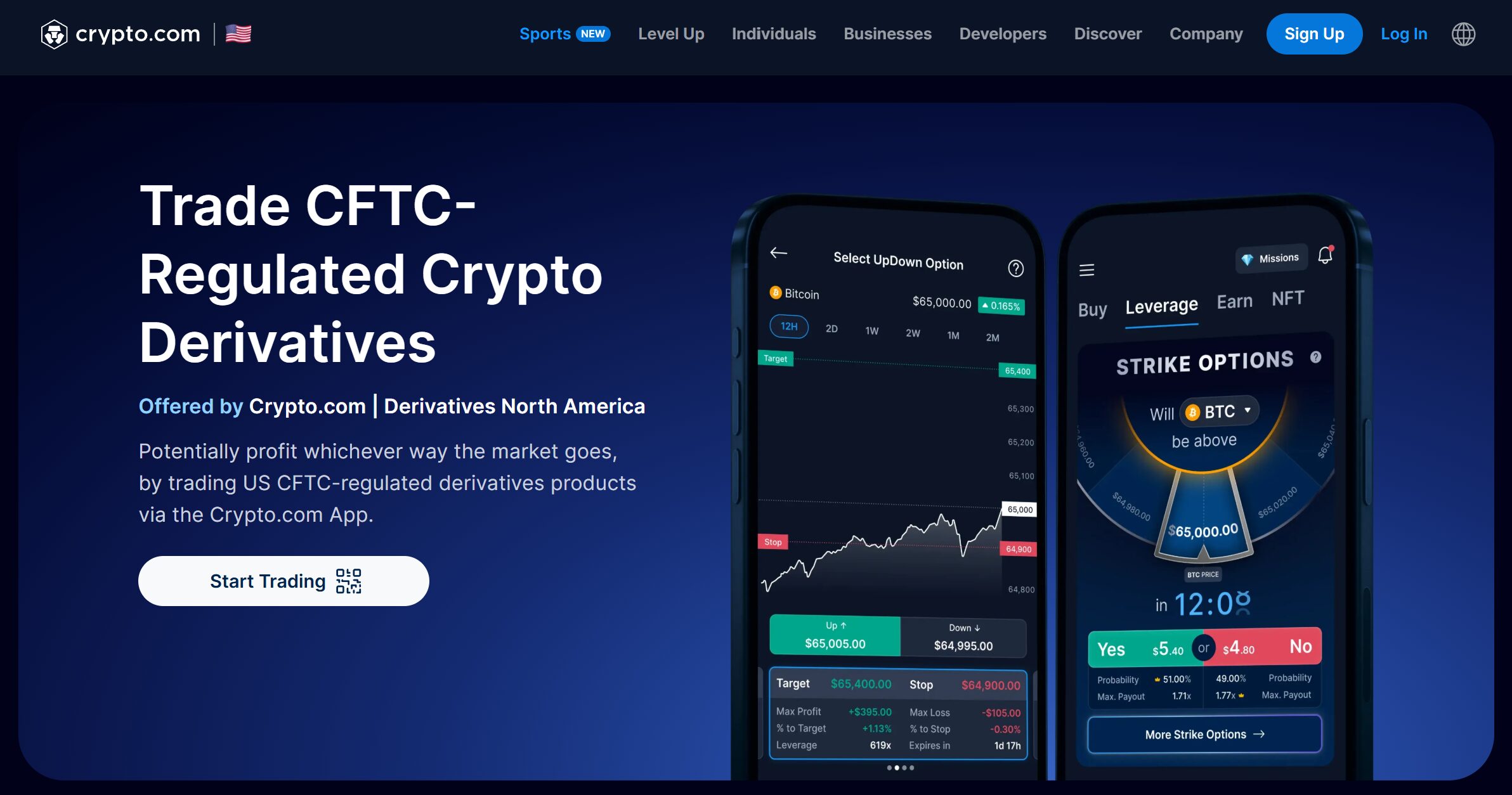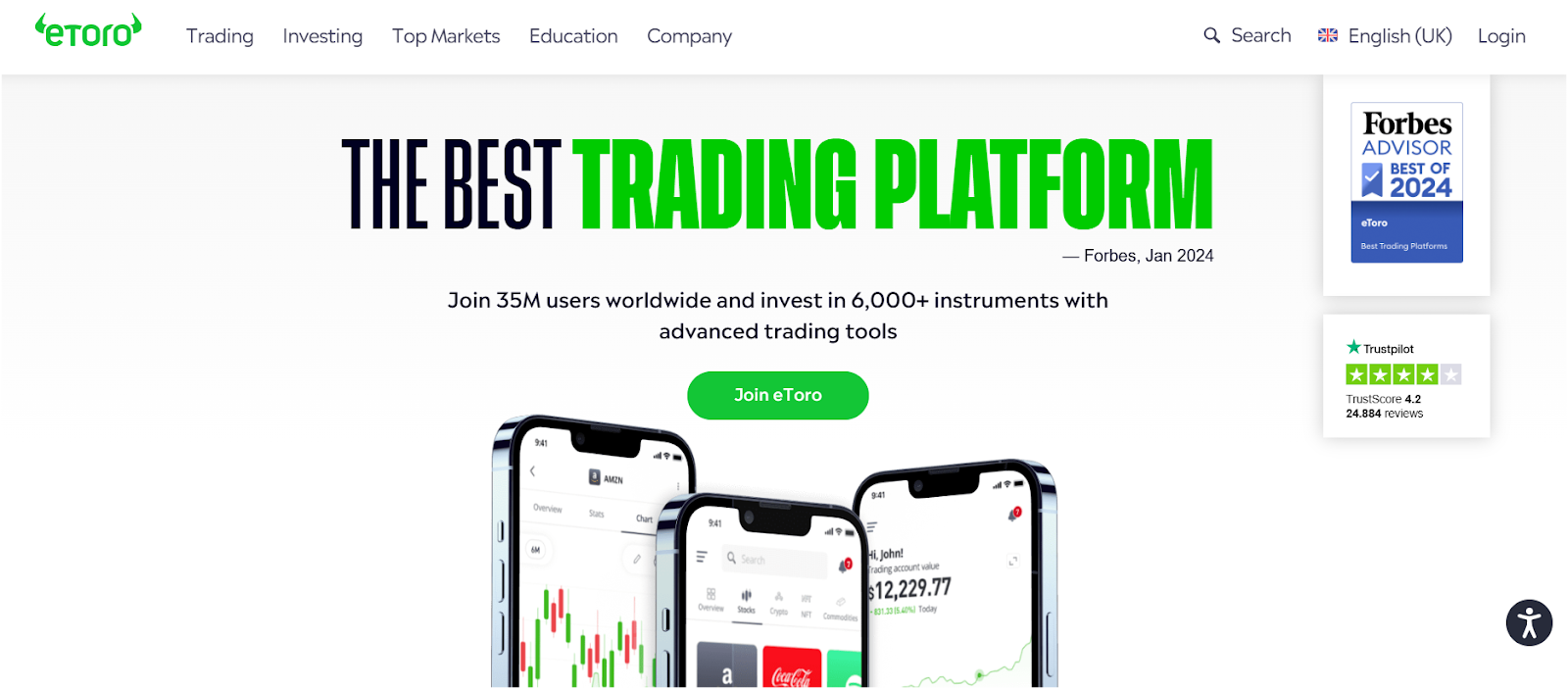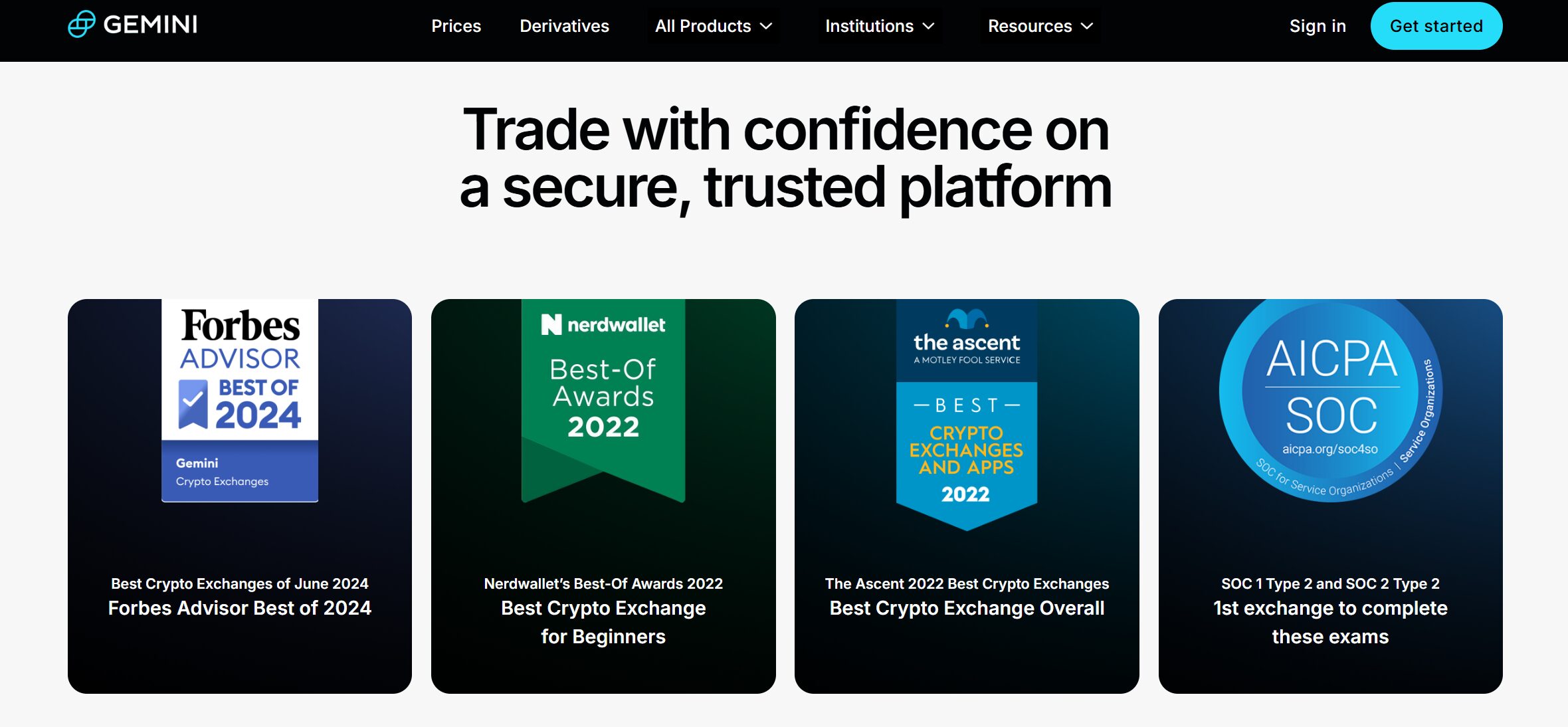If you’re looking for Coinbase alternatives, you have arrived at the right place. Coinbase is one of the top crypto exchanges, offering 550+ spot pairs and 150+ perpetual contracts. However, it has higher trading fees compared to other exchanges. It also lacks copy trading feature and its customer support is harder to access.
In this article, we’ll provide deeper insights into Coinbase alternatives with low trading fees or advanced features. Our list also comprises trading platforms that enable you to invest in other assets like precious metals or stocks.
List of 10 Best Coinbase Alternatives for 2025
- Binance – Largest cryptocurrency exchange.
- Kraken – Best crypto exchange for advanced trading features.
- Crypto.com – Best crypto exchange for derivatives trading.
- iTrustCapital – Award-winning platform for crypto IRAs.
- eToro – Largest platform for social trading.
- Gemini – Top cryptocurrency exchange for security.
- Uphold – Best crypto exchange for staking.
- KuCoin – Best crypto exchange for low fees.
- Bitstamp – Oldest crypto exchange.
- Robinhood – Best platform for advanced tools.
Top 10 Coinbase Alternatives for 2025
1. Binance – Largest cryptocurrency exchange


Binance is the world’s largest centralized exchange for trading cryptocurrencies. Its average daily trading volumes are over $65 billion, and it operates in more than 100 countries.
For spot and margin trading, Binance is one of the best Coinbase alternatives. Besides, newcomers can utilize the exchange’s copy trading feature to mirror the profitable strategies of successful investors.
If you’re a seasoned trader, Binance’s crypto futures and options are worth exploring. You can also use the exchange’s trading bots to automate your crypto transactions.
To safeguard customer assets, Binance has implemented security features like two-factor authentication, withdrawal address whitelisting, data encryption, and anti-phishing codes. It has also created the Secure Asset Fund for Users (SAFU) to protect user funds.
A standout feature of Binance is its low fees, starting from 0.1% for both makers and takers. For futures trading, the maker and taker fees start from 0.02% and 0.05%, respectively. If you hold Binance Coins (BNB), you’ll obtain trading fee discounts. Moreover, Binance follows a tiered fee structure. The higher your VIP tier, the lower your fees.
Pros
- Facilitates peer-to-peer (P2P) trades using 800+ payment options.
- Low trading fees.
- 24/7 customer support is available in 40 languages.
- Advanced features and trading tools.
- Deep liquidity.
- Binance Academy with extensive learning resources on all things crypto.
- Supports staking of 300+ cryptocurrencies through Binance Earn.
Cons
- Binance US has limited features and fewer trading pairs.
- Complex interface for beginners.
- Regulatory uncertainties and challenges in the US.


2. Kraken – Best crypto exchange for advanced trading features


Kraken is a Forbes-recognized crypto exchange based in Wyoming, USA. Since its launch in 2011, Kraken has established operations in over 190 countries, serving more than 5 million customers.
With Kraken, you can trade over 472 assets globally. The exchange also lets you buy crypto with as little as $10, using fiat currencies or other cryptocurrencies.
Whether you’re a beginner or an experienced trader, Kraken offers two trading interfaces, each designed to meet your specific needs. The first interface facilitates simple crypto transactions such as spot trading.
The second interface, Kraken Pro, is exclusively built for advanced traders. It comes with advanced trading tools, live market data, customizable layouts, and 25+ data widgets. It supports multiple collateral and payout options while offering deep liquidity. Thus, margin trading is a breeze with Pro.
Additionally, Pro has integrated staking features to help crypto users earn an annual percentage yield (APY) of up to 24%.
Lastly, Kraken has implemented industry-leading security features to safeguard customer assets. These include proof-of-reserves, hot wallet solutions, advanced cold storage, two-factor authentication, and secure socket layer (SSL) encryption.
Pros
- Responsive user interface and mobile app.
- Supports 300+ derivatives and 11,000+ tokenized stocks.
- Comprehensive order books.
- Customer support is available via email, chat, and phone.
- Low fees starting from 0.25% for makers and 0.4% for takers.
Cons
- The complex interface for trading can be overwhelming for beginners.
- Levies a fixed trading fee of 1% for non-Kraken+ users.


3. Crypto.com – Best crypto exchange for derivatives trading


Crypto.com is a premier Coinbase alternative, headquartered in Singapore. It is an all-in-one exchange that facilitates stocks, ETFs, and CFTC-regulated sports events trading, along with crypto trading.
With Crypto.com, you can trade 400+ cryptocurrencies using 20+ fiat currencies. Additionally, its trading interface has advanced features like UpDown options that pinpoint trading opportunities regardless of market conditions.
Its spot order book is quite comprehensive, enabling you to choose from 500+ pairs. If you’re looking for advanced tools, Crypto.com’s customizable trading bots are worth exploring.
For institutional traders, Crypto.com offers a specially designed product suite, including institutional Application Programming Interfaces (APIs).
To protect user assets, Crypto.com has implemented measures like multi-factor authentication, hardware security modules (HSMs), withdrawal address whitelisting, and proof-of-reserves. It also possesses security and regulatory compliance certifications like SOC2 Type 1, PCI: DSS, and ISO 22301:2019.
Lastly, Crypto.com imposes low fees starting from 0.25% for makers and 0.5% for takers without a CRO balance.
Pros
- Offers crypto derivatives regulated by the Commodities Futures Trading Commission.
- 24+ customizable thematic crypto baskets.
- User-friendly interface.
- 24/7 live customer support.
- Matching engine with 64 million TPS and 370-nanosecond core latency.
- Visa prepaid debit card with up to 6.5% rewards.
- 140 million global user base.
Cons
- A high 30-day minimum trading volume of $2.5 million is required to qualify for the VIP program.
- Higher fees for withdrawals.


4. iTrustCapital – Award-winning platform for crypto IRAs


iTrustCapital is the top Coinbase alternative for self-trading assets using tax-advantaged retirement accounts. Whether you want to trade precious metals, digital assets, or cryptocurrencies, iTrustCapital offers two options. These include Individual Retirement Account (IRA) and Premium Custody Account (PCA).
With iTrustCapital, users can transfer existing IRAs or start a new one. You can rollover different types of retirement accounts, including 401(k), 457, 403(b), etc. The platform also eliminates the inherent drawbacks of older IRA models. Thus, you can move funds from your tax-advantaged retirement account into the cryptocurrency, gold, and silver markets smoothly.
The benefits of opening an iTrustCapital account include a new IRA setup, tax reporting, and zero account fees. It facilitates seamless transfers, rollovers, or contributions to fund your IRA, while providing unlimited storage with institutional custody partners. Most importantly, you can grow crypto assets tax-deferred (traditional IRA) or tax-free (Roth IRA).
If you want to trade digital assets using a non-IRA account, explore PCA. It is conducive for both beginners and experienced traders, and offers exclusive benefits like 24/7 crypto trading and low fees. Its outstanding feature is the closed-loop system, which allows deposits in USD or crypto, but withdrawals in USD only.
Pros
- Minimum deposit of just $1,000 required to open an account.
- Customer support is available via phone and chat.
- Regulated custodian.
- Enables self-trading through tax-advantaged retirement accounts.
- No monthly or annual charges.
Cons
- Higher trading fees of 1% for crypto transactions.
- Supports fewer cryptocurrencies.
5. eToro – Largest platform for social trading


eToro is a leading social trading platform for buying and selling stocks, ETFs, options, and cryptocurrencies. It is also the best Coinbase alternative for copy trading without incurring hidden charges.
Another notable feature of eToro is the smart portfolio. It comprises a collection of crypto asset bundles that are curated based on a particular theme or trading strategy. Additionally, they require a minimum investment of only $500 and don’t need traders to time the market or choose assets.
On the flip side, eToro is not a crypto-first platform. You can find only popular cryptocurrencies such as Bitcoin, Ethereum, or Bitcoin Cash on eToro. It also charges a higher fee of 1% for crypto transactions compared to other platforms.
Pros
- Demo account.
- CopyTrader feature to help users follow successful investors.
- Customer support is available via a chatbot and ticketing system.
- Intuitive user interface and mobile app.
- No commissions or contract fees for stocks, ETFs, and options.
- Supports deposit methods like bank transfers and debit cards.
Cons
- Supports limited cryptocurrencies.
- All trading features are unavailable in all locations.


6. Gemini – Top cryptocurrency exchange for security


If you’re looking for a crypto exchange with top-notch security and regulatory compliance, Gemini is the best. Established by the Winklevoss brothers in 2014, Gemini is the first crypto-native platform to obtain the SOC1 Type 2 and SOC 2 Type 2 certifications. It is also ISO 27001-certified.
Moreover, Gemini is a full-reserve exchange cum custodian. Furthermore, it has implemented strong security features like two-factor authentication, FDIC-insured hot wallets, and air-gapped cold storage.
For individual traders, Gemini facilitates the buying and selling of 85+ cryptocurrencies. Its cutting-edge features, like recurring buy, dynamic price alerts, user-friendly interface, and consolidated dashboard, make spot trading effortless.
For experienced traders, Gemini offers perpetual contracts, including index-based futures. Additionally, Gemini allows cross-collateralization. Hence, you can utilize other crypto assets apart from GUSD (Gemini United States Dollar) as collateral for margin trading.
ActivTrader, Gemini’s trading interface, is suitable for both beginners and seasoned traders. Integrated with advanced trading tools, ActivTrader helps you customize your trading experience. Moreover, Gemini gives you enhanced liquidity by combining USD and GUSD order books.
Lastly, Gemini follows a volume-based fee structure. It levies 0.2% for makers and 0.4% for takers with 30-day trading volumes below $10,000. As volumes of trade increase, your fees decrease.
Pros
- Demo trading.
- High-speed user interface.
- Central limit order books.
- Offers 20+ tokenized US stocks.
- Rewards of up to 5.52% through Gemini Stake.
- Over-the-counter (OTC) trading and institutional-grade cold storage for businesses.
Cons
- Lacks copy trading.
- Fewer trading pairs than Coinbase.
7. Uphold – Best crypto exchange for staking


Uphold is the best Coinbase alternative for crypto users who wish to earn passive income from their cryptocurrency holdings. It helps you instantly stake and unstake 20+ digital assets and get rewards of up to 16.3% APY.
Additionally, Uphold is best-suited for investors seeking early access to new tokens before they’re listed on other exchanges. As Uphold is linked to many underlying trading venues and supports multiple assets, it helps discover new coins early. The platform also helps you buy and sell precious metals and environmental assets.
Moreover, Uphold has implemented cutting-edge security features based on radical transparency. It is 100% reserved and publishes its assets and liabilities every 30 seconds in real-time. Furthermore, it never loans out your digital assets. Hence, the assets are available for withdrawal whenever you need.
For enterprises, Uphold streamlines customer onboarding. It also facilitates fiat on/off ramps and swapping of 300+ tokens. Furthermore, it helps businesses deliver digital assets directly to their customers and make payment processes more efficient.
Lastly, Uphold has an edge over other exchanges when it comes to institutional investor services. It ensures optimal execution of bulk trades, enabling clients to liquidate large positions with minimal price impact.
Regarding trading fee structure, Uphold charges varying rates for different asset classes.
| Asset category | Trading fee |
| Stablecoins | 0.25% |
| FX market | 0.3% |
| Bitcoin, Ethereum | 1.4% – 1.6% |
| Altcoins | 2.5% – 2.95% |
| Precious metals | 1.9% – 2.95% |
Pros
- Cheaper and faster borderless payments.
- 300+ digital assets across 39+ chains.
- Deep liquidity aggregated across 30+ trading venues, including centralized and decentralized exchanges.
- 50+ operating licenses worldwide.
Cons
- Higher fees than Coinbase for crypto trading.
- Limited features for advanced trading.
8. KuCoin – Best crypto exchange for low fees


Kucoin is a leading centralized exchange based in Seychelles. Founded in 2017, Kucoin currently operates in 200+ countries and serves over 40 million crypto traders worldwide.
In terms of security, KuCoin stores your crypto in industry-leading encrypted storage and maintains 100% proof-of-reserves to ensure adequate funds for users. To further protect accounts, the exchange implements measures such as two-factor authentication, anti-phishing codes, HSMs, and privacy protection.
For institutional investors, Kucoin offers a market maker program. It provides exclusive benefits like low trading fees, low-interest loans, multiple sub-accounts, custodian services, higher withdrawal limits, one-on-one support, etc.
Lastly, Kucoin’s trading fee is determined by asset class, KCS balance, and 30-day trading volumes. The maker/taker fee for asset classes A, B, and C starts from 0.1%, 0.2%, and 0.3%, respectively.
Pros
- 24/7 customer support via chatbot and ticketing system.
- No transaction fee for crypto-to-crypto conversions.
- API services for 600+ fiat and digital assets.
- Supports trading of cryptocurrencies, stocks, and ETFs using both isolated and cross margins.
Cons
- Complex fee structure.
- No copy or demo trading.


9. Bitstamp – Oldest crypto exchange


Launched in 2011, Bitstamp is the world’s longest-running crypto exchange based in Luxembourg. It has a global user base of 4 million and has secured an AA rating in CryptoCompare’s Exchange Benchmark report.
The Bitstamp Pro is a customizable trading interface exclusively designed for advanced traders. From actionable market insights and real-time charts to advanced trading features, the Pro dashboard provides a unified view of your trading activities. It also offers robust connectivity, 24/7 live data streams, and graphic visualizations of portfolio performance.
Lastly, Bitstamp follows a volume-based fee model. Spot fees start from 0.3% for makers and 0.4% for takers with 30-day trading volumes below $10,000.
Pros
- User-friendly interface.
- Ethereum and Cardano staking offering APYs of up to 3.1% and 1%, respectively.
- Competitive yields of up to 6% APY for crypto lenders.
- Extensive learning resources.
- Basic mode for buying and selling cryptocurrencies quickly.
Cons
- Higher fees, especially for frequent traders.
- Slower processing of withdrawals.
10. Robinhood – Best platform for advanced tools.


Robinhood is a customer-focused and high-performance Coinbase alternative for stocks, cryptocurrencies, and derivatives. It provides a 1% IRA match on transfers, contributions, and 401(k) rollovers into self-directed IRAs.
With Robinhood, you can obtain more crypto for a given amount. For instance, you’ll get 0.003811 ETH for $10 on Robinhood as opposed to 0.003498 ETH on Coinbase. Moreover, you can automate crypto trading by setting recurring purchases for as little as $1.
In terms of security, Robinhood ensures your digital assets are stored in cold storage. It has a crime insurance coverage underwritten by Lloyds syndicate to protect the stored assets from theft and cybersecurity breaches. Additionally, the platform gets its systems audited by third-party security experts regularly.
For advanced traders, Robinhood facilitates commission-free trades on stock, ETF, and index options. If you’re seeking a platform that allows derivatives trading without a pattern day trader (PDT) rule, Robinhood is excellent.
Pros
- Licensed by FinCen and the New York State Department of Financial Services.
- 24/7 customer support.
- No crypto deposit or withdrawal fees.
- Visa Signature credit card with 3% cashback and zero annual charges.
- Customizable trading interface.
- Offers competitive APYs for Ethereum and Solana staking.
Cons
- Supports limited cryptocurrencies.
- Only Gold members can access Robinhood’s full suite of advanced trading features.
- Higher fees compared to other exchanges.
Comparison of the Best Alternatives to Coinbase
| Coinbase Alternative | Trading fees | Coins Supported | |
| Maker | Taker | ||
| Binance | 0.1% | 0.1% | 500+ |
| Kraken | 0.25% | 0.4% | 467+ |
| Crypto.com | 0.25% | 0.5% | 434+ |
| iTrustCapital | 1% | 1% | 50+ |
| eToro | 1% | 1% | 79+ |
| Gemini | 0.2% | 0.4% | 82+ |
| Uphold | 0.25% – 2.95% | 0.25% – 2.95% | 300+ |
| KuCoin | 0.1% | 0.1% | 900+ |
| Bitstamp | 0.3% | 0.4% | 101+ |
| Robinhood | 0.85% | 0.85% | 15+ |
How to Choose the Right Coinbase Alternative?
When choosing a Coinbase alternative, consider the following factors:
- Low fees: Most traders switch to Coinbase alternatives due to its higher fees. By selecting a platform with lower trading fees, you can maximize your gains.
- Trading features: Though Coinbase offers advanced tools for trading, it lacks features like copy trading, demo trading, and trading bots. Demo trading helps you practice trades in a simulated environment, while copy trading helps emulate the strategies of successful traders. Hence, choose crypto exchanges that provide these functionalities.
- Customer support: Always opt for crypto exchanges that offer 24/7 customer service with fast response times.
- Staking: Coinbase facilitates only Ethereum and Solana staking. If you want to stake lesser-known cryptocurrencies to earn rewards, choose platforms that support a wide range of coins.
- Security and regulatory compliance: Choose only licensed and legally-compliant exchanges with sophisticated security measures.
Conclusion
Experienced traders regularly add a hardware wallet to their crypto trading toolkit when exploring Coinbase competitors. This approach enhances the security of digital assets while enabling access to low fees, advanced features, diverse products, and social trading. Overall, Coinbase alternatives address the drawbacks of Coinbase and help traders diversify their portfolios.
FAQs
What is the best alternative to Coinbase?
The overall best alternative to Coinbase is Binance. For US traders, Kraken and Gemini are some of the top Coinbase alternatives. If you’re seeking a platform with social trading emphasis, eToro is probably the right exchange for you.
Who is Coinbase’s biggest competitor?
Binance is the biggest Coinbase competitor globally. However, in the US, Kraken is the best Coinbase alternative.
Why is Kraken better than Coinbase?
Kraken is better than Coinbase due to its low fees, advanced trading features, and superior customer support. It also offers better services for institutional investors. While Coinbase is more beginner-focused, Kraken is suitable for both newcomers and seasoned investors.
Who has lower fees than Coinbase?
Binance, Kraken, Crypto.com, Gemini, Kucoin, and Bitstamp have lower fees than Coinbase. You can also explore decentralized exchanges like Uniswap, Pancakeswap, and dYdX for trading cryptocurrencies at low fees.
What are the best apps like Coinbase for beginners?
Robinhood, Uphold, and Gemini are the best apps like Coinbase for beginners. If you want to engage in social trading or replicate the strategies of successful traders, eToro is ideal.
What are the best Coinbase alternatives for users in the USA?
Kraken and Gemini are the best Coinbase alternatives for experienced traders based in the US. Conversely, Robinhood and Binance US are suitable options for beginners. For social trading, eToro is the go-to platform.
 Bitcoin
Bitcoin  Ethereum
Ethereum  Tether
Tether  XRP
XRP  USDC
USDC  TRON
TRON  Lido Staked Ether
Lido Staked Ether  Dogecoin
Dogecoin  Figure Heloc
Figure Heloc  Cardano
Cardano  Bitcoin Cash
Bitcoin Cash  Wrapped stETH
Wrapped stETH  WhiteBIT Coin
WhiteBIT Coin  Wrapped Bitcoin
Wrapped Bitcoin  Wrapped eETH
Wrapped eETH  USDS
USDS  Chainlink
Chainlink  Binance Bridged USDT (BNB Smart Chain)
Binance Bridged USDT (BNB Smart Chain)  Monero
Monero  LEO Token
LEO Token  WETH
WETH  Stellar
Stellar  Coinbase Wrapped BTC
Coinbase Wrapped BTC  Sui
Sui  Zcash
Zcash  Ethena USDe
Ethena USDe  Litecoin
Litecoin  Avalanche
Avalanche  Hyperliquid
Hyperliquid  Hedera
Hedera  Shiba Inu
Shiba Inu  Canton
Canton  USDT0
USDT0  sUSDS
sUSDS  World Liberty Financial
World Liberty Financial  Dai
Dai  Toncoin
Toncoin  Cronos
Cronos  PayPal USD
PayPal USD  Ethena Staked USDe
Ethena Staked USDe  Uniswap
Uniswap  Polkadot
Polkadot  USD1
USD1  Mantle
Mantle  MemeCore
MemeCore  Rain
Rain  Bittensor
Bittensor  Pepe
Pepe 


